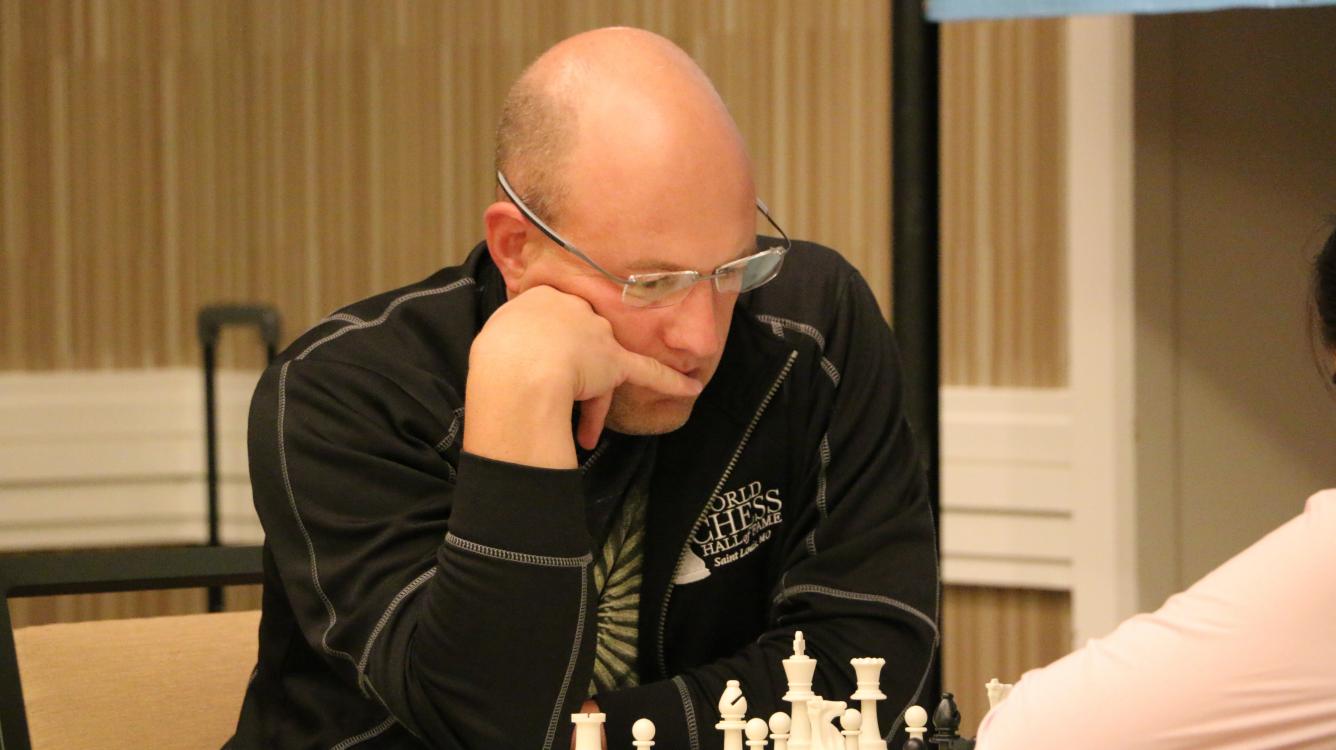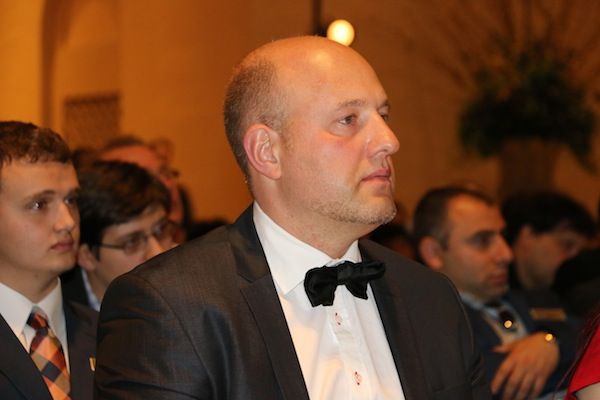
GM Shabalov Wins U.S. Open, Will Return To U.S. Championship
Most players wouldn't consider 8.5/9 to be "perfect" but don't tell that to GM Alex Shabalov. After missing two consecutive U.S. championships, one of the most decorated American players in recent memory made it his goal to return.
He will do just that next spring. By virtue of winning the 2015 U.S. Open in Phoenix from August 1-9, Shabalov received $7,408 and an automatic bid to the annual St. Louis tournament.
It's rare to fulfill a goal so immediately but that's exactly what the grandmaster did. Prior to the 2015 U.S. Championship in April, Shabalov was inducted into the U.S. Chess Hall of Fame. "This is not a retirement speech," he said then.
When asked by Chess.com then if he'd played in his last national championship, he said "no" emphatically. With all the high-rated players transferring and improving within the U.S., how was he going to get back in?
"The U.S. Open, of course!" Shabalov said.

Four-time U.S. champion GM Alex Shabalov in April prior to being inducted into the U.S. Chess Hall of Fame. He seemed slightly chagrined to be honored like this while still a very active player.
The tournament is bit of a rarity in the U.S. -- the "traditional" schedule allows competitors to play one game per day for nine days, with one large section (what Europeans might call a "completely normal schedule"!). There are nonetheless other Americanized options -- accelerated six-day or four-day schedules, with all fields joining after round six.
Shabalov chose the six-day format and promptly blitzed through his peers, going 6-0 before the merge. Although he closed his tournament by playing three GMs and an IM, he cited his fourth-round game against NM Christopher Toolin as his toughest.

The endgame seemed easily winning, but the resources of Black nearly held the draw. "The bishop is not that much worse than the rook in pawn races," Shabalov explained. What's the major difference? "The rook can create mating threats."
Shabalov did just that:
Shabalov took out GM Bartlomiej Macieja in round six, then GM Alejandro Ramirez the following round. In both games he said he felt lucky, but he now stood all alone at 7.0/7 going into the final weekend.
He guessed that Macieja's experience may have caused him to mistakenly trust that 23. Bg5 worked. "When I played Bg5 he kind of believed me, just like people believed Tal," Shabalov said, referencing his Latvian mentor.
"Any kid today would have played the best move, Qc7. Black has only three pawns guarding his king. According by all rules it has to be checkmate somewhere. Just because I didn't see it for 40 minutes, I thought I should be stupid."
There's just one problem. Shabalov is not stupid. There simply wasn't a mate.

In round eight, up stepped IM Andrey Gorovets, the third-straight 2600 Texan to sit across from him. "Shabba" then messed with Texas once more.
Analysis by GM Dejan Bojov:
Now on 8.0/8, Shabalov led all chasers by a full point. All that was needed was a final-round draw, with White, versus GM Illya Nyzhnyk. You'd think that a man who said his participation in the tournament was "100 percent" tied to the automatic U.S. championship slot would be satiated with equality, but for a good portion of the game Shabalov was going for 9-0.
As he explained, his theoretical knowledge was that Black can't play ...Re8 and ...b5 in the Exchange Variation of the King's Indian Defense, since after a4 and White's bishop takes back, the c-pawn is pinned.
"I was surprised he played that," Shabalov said. "I thought he handed it to me. I thought he was nervous but he prepared really well.
"It's the modern computer prep versus my knowledge of 30 years ago. This game is a huge lesson. You can resurrect an old line that is thought to be bad."
Shabalov played 17. d6 with every intention of going for the win. Eventually, he realized he had no advantage, and switched his thinking back to pragmatism. His bishop pair earned him the needed draw.
Had he allowed Nyzhnyk to win, Shabalov could have faced twin tiebreak games -- one for the U.S. Open title and possibly one more with another American on 8.0/9 for the U.S. championship invite. On top of all that, he would have missed his flight back home. Instead, his dream tournament came true.
Now, he wants to show that he can win another U.S. championship. He also said he wants Hikaru Nakamura, Fabiano Caruana and Wesley So to all play. Shabalov knows the lifetime titles race by heart. Gata Kamsky, five; Nakamura and himself, four.
Second place was shared by GMs Nyzhnyk, Ramirez, Macieja, Conrad Holt (the 2014 champion), Mac Molner, Rogelio Barcenilla, Andre Diamant and IM Gorovets.
In side events of the U.S. Open, GM Aleks Lenderman won the U.S. National G/15 Championship and Holt won the U.S. Open National Blitz Championship, although IM John Bryant nearly cost him first place with a miracle in the second-to-last round. Make sure you watch until the end!
In the Denker Tournament of High School Champions, Wisconsin representative NM Alex Velikanov (2398) won with 5.0/6. The Barber Tournament of K-8 Champions was won by Oklahoman Advait Patel (2378) with 5.5/6 and the National Girls' Invitational Tournament was won by four girls on 5.0/6, with Jennifer Yu of Virginia having the best tiebreaks.
A lot of other business took place inside the Arizona Biltmore during the swelteringly hot event (temperatures reached 112 F or 44 C). The USCF showed off its new logo and its new name. From now on, they will be referred to on these pages as US Chess or the US Chess Federation.
Several Chess.com team members and contributors won awards. Our own IM Danny Rensch won the US Chess Meritorious Service Award for his contributions to scholastic coaching and the growth of the game through this site. GM Irina Krush, a frequent commentator for Chess.com, won Grandmaster of the Year. Yours truly won the Chess Journalists of America's Journalist of the Year Award, as well as Best Tournament Report.

We don't know the format of the 2016 U.S. Championship yet, but it is confirmed to be returning to St. Louis. Three players are assured invites: Shabalov, GM Hikaru Nakamura (defending champion) and IM Akshat Chandra (winner of the U.S. Junior Invitational).



